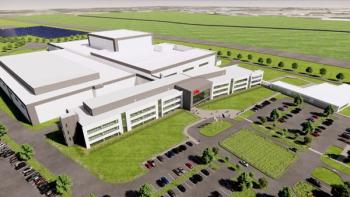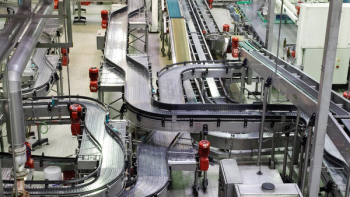
Cold Chain: Delivering Innovative Specialty Pharmaceutical Products
Rafael Teixeira on building an end-to-end cold chain strategy to support global storage and distribution efforts.
Over the last decade, we have seen a proliferation of complex, temperature-sensitive specialty drugs—like biologic medicines and cell and gene therapies—that require cold chain handling. In fact, in 2018, half of the drugs approved by the US Food and Drug Administration (FDA) were temperature-sensitive products.1
As the pipeline of specialty pharmaceutical products has increased in recent years, pharma companies and logistics providers have made significant investments in cold chain infrastructure, packaging solutions and technology capabilities to support the secure and reliable distribution of these products around the world.
With the enhanced capabilities—and tremendous collaboration between government agencies and manufacturers—supply chain partners have distributed billions of COVID-19 vaccine doses worldwide. Although we’re still in the early stages of the global vaccine rollout, the pandemic has put a spotlight on the importance of an end-to-end global cold chain strategy and reinforced the need for continued innovation and investments, particularly to support last-mile deliveries in low-income countries or in regions with limited infrastructure.
Expanding global access to innovative specialty products is vital to improve patient outcomes and maximize product success. The distribution of these therapies—from the manufacturer’s facility all the way to the site of care—demands flawless execution, as an unbroken temperature chain is essential to both patient safety and product success. As such, it’s critical for pharmaceutical companies and their logistics partners to build rigorous yet flexible supply chain strategies that incorporate temperature-controlled solutions, validated storage, and advanced tracking technology to maintain product integrity throughout transportation.
Temperature-controlled packaging solutions
As the demand for cold chain solutions has increased in recent years, pharmaceutical companies have prioritized investments to build out the services needed to support these therapies. Global spending on biopharma cold chain logistics has climbed steadily since 20182 and is expected to grow another 25 percent over the next three years, reaching $21.3 billion in 2024. In 2020, about $5 billion—nearly 30 percent of the $17.5 billion spent on pharmaceutical cold chain—went toward packaging costs, as well as tracking technology and monitoring solutions, like data loggers.
The uptick in packaging spending reflects the essential role cold chain packaging solutions play in protecting product integrity and quality throughout deliveries around the world. Passive packaging solutions, in particular, provide extended temperature stability, enabling reliable deliveries to very remote communities and protecting product integrity through potential challenges like airport customs delays or extreme climate variations. For example, our next-generation passive solution, Cocoon,3 uses a combination of honeycomb, vacuum-insulated panels and advanced phase change materials to provide stable thermal protection for 168 hours across several temperature ranges, including frozen (-15 to -25°C) and refrigerated (2 to 8°C).
Selecting the right packaging solution is critical to maximize patient access and drive product success. The solution should be carefully designed to ensure that the shipment arrives on time, intact, and within range. As such, pharmac companies should engage logistics partners early in the clinical or commercialization planning process.
After learning more about the product and destination, logistics providers will leverage data and testing results to tailor recommendations regarding the right packaging for the most efficient transport route, ultimately helping manufacturers save time, reduce costs, and ensure optimal security. Temperature-control experts can use a climate chamber to test and validate all types of packaging against a variety of conditions, including a full range of temperatures, allowing the team to select—or develop—a climate-controlled packaging solution to meet a client’s specific needs.
Cryogenic storage and transport
While many cold chain products require storage at refrigerated (2 to 8°C) or frozen (-15 to -25°C), a growing number of advanced specialty therapies, like cell and gene therapies, require ultra-frozen (as low as -80°C) or cryogenic (as low as -196°C) storage. The ultra-frozen or cryogenic requirements, coupled with the products’ extremely short shelf life, add another layer of complexity to the supply chain, demanding near flawless execution throughout the distribution process—from the manufacturer’s facility to a third-party logistics (3PL) storage facility, and then deliveries out to each point of care.
To help manage these complexities, innovators developing allogenic therapies should look to qualify cryopreserved transport and storage from a single source. When evaluating potential partners, it’s important to consider their storage network, shipping capabilities and technology platforms.
With the increased globalization of supply chains, logistics partners should provide validated cryogenic storage as well as a network of cryogenic charging centers and charging stations in strategic markets worldwide. Logistics partners should also offer a fleet of dry shippers—a strongly engineered cylindrical metal container enclosed in a rigid outer case—to maintain the specified temperature range and protect product integrity throughout transport. Given the high stakes for both patients and manufacturers of cell and gene therapies and other products with ultra-frozen requirements, it’s critical for pharmaceutical companies to begin planning early and choose a partner that can deliver a complete cryogenic supply chain.
Monitoring and tracking technology
Given the stringent temperature and time requirements associated with innovative specialty pharmaceuticals, it’s essential to deploy tracking technology, like smart-monitoring solutions, that provide end-to-end visibility. Advanced technology solutions and smart-monitoring tools track and transmit the required metrics with precision, including ambient temperature, internal temperature, light, tilt, pressure, physical shock and geographic location. Tracking capabilities should leverage the latest in Global Positioning System (GPS), Global System for Mobile communication (GSM), and Bluetooth Low Energy (BLE) technologies, with the ability to deliver metrics to a secure, cloud-based platform so they can be accessed by all stakeholders whenever and wherever they’re needed. The real-time data not only provides proof of shipment stability, but also enables teams to anticipate complications before they arise and dispatch an associate quickly to take a corrective action, like replenishing a gel pack or simply replacing a monitor with a battery.
Planning for the future
The pace of innovation across the healthcare and pharmaceutical industries isn’t slowing. Manufacturers continue to produce innovative specialty products that offer significant benefits to patients across the world. Products with cold chain storage requirements will account for a growing number of these new therapies. In fact, recent reports4 suggest that cold chain products will grow at approximately twice the rate of non-cold chain products during a six-year window, from 2018 to 2024.
To expand global access to these innovative specialty therapies, pharmaceutical companies need to engage their logistics partners early in the planning process to build an end-to-end logistics strategy that ensures the product is delivered on time, and in the right condition. Pharmaceutical companies and logistics providers that continue to make investments to enhance their cold chain packaging solutions, storage infrastructure—particularly in strategic global markets—and tracking technology will be equipped to support the reliable and secure distribution of these specialty products around the world.
Rafael Teixeira is President,
Notes
Newsletter
Lead with insight with the Pharmaceutical Executive newsletter, featuring strategic analysis, leadership trends, and market intelligence for biopharma decision-makers.




